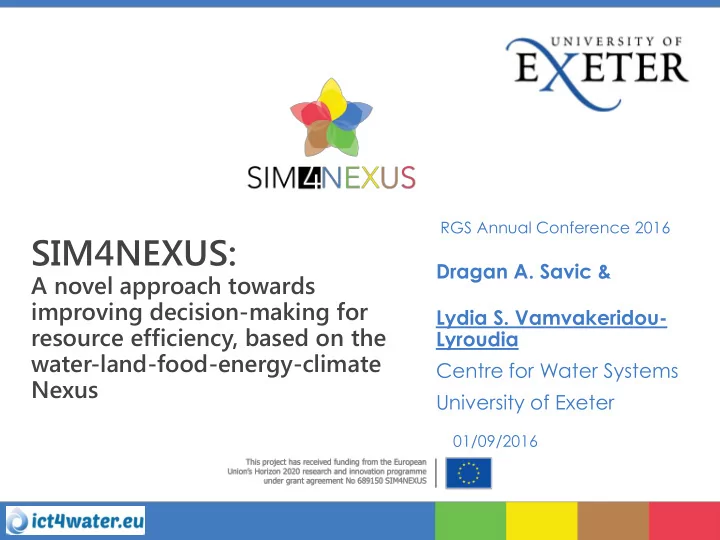

RGS Annual Conference 2016 SIM4NEXUS: Dragan A. Savic & A novel approach towards improving decision-making for Lydia S. Vamvakeridou- resource efficiency, based on the Lyroudia water-land-food-energy-climate Centre for Water Systems Nexus University of Exeter 01/09/2016
SIM4NEXUS project • H2020 project SIM4NEXUS • Sustainable Integrated Management FOR the NEXUS of water-land-food-energy-climate for a resource-efficient Europe • Grant of € 7.9M • 4 year project (2016-2020) • Started June 2016 • 26 partners from 16 European countries • Co-ordination: Wageningen University & Research • Core team: University of Exeter, University of Thessaly
Project Objectives SIM4NEXUS has four objectives: 1. To adopt existing knowledge and develop new expertise on the Nexus , 2. To reduce uncertainties of how policies, governance and institutions affect complex changing environmental systems, 3. To showcase the implementation by a network of regional and national case studies in Europe 4. To valorise the project outputs by suitable business models.
The Nexus for resource efficiency Target : Resource efficiency Five Nexus components • Water • Energy • Food • Land use • Climate under Climate Change
The Nexus for resource efficiency Target: Resource efficiency Instruments: • Technology • Economic development • Social cohesion • Social innovation • Governance • Policy under Climate Change
Previous related research: Thematic models Several well established and developed “thematic” models” do exist: • Simulating some (but not all five) Nexus components • At some scales (e.g. Global) • Not necessarily targeting resource efficiency • Some targeting GHG • Or biodiversity • Or the economy • But not all…
Thematic models in SIM4NEXUS
The main idea(s) Using the “thematic models” to identify the links and the gaps in • the Nexus With diverse Data Sources and Climate change scenarios • Running the thematic models • Combining outputs from the thematic models using Complexity • Science methodologies: System Dynamics mainly (previous expertise) • Cellular Automata • Fuzzy Pattern Recognition • Material Flow Analysis • To develop “Nexus” models for specific Case Studies and scenarios • To develop a Serious Game for education and decision makers •
Concept Nexus with before integration partial integration SIM4NEXUS with� high� uncertainty� water energy All� Nexus� food land climate components� interac ng� with� reduced� policy� &� decision� making� uncertainty� complexity� science� producing� knowledge� integrated� knowledge� thema c� models� Common� prac ce� with� silo-thinking,� Decision� making� par ally� SIM4NEXUS� approach:� NEXUS-� fragmented� policy� and� decision� making� integra ng� Nexus� components� compliant� R&D� and� policy-making� and� R&D� support� with� high� uncertainty� about� results�
Structure
The Serious Game SIM4NEXUS to develop a Serious Game With an Innovative Knowledge Elicitation Engine (KEE) • Based on Aqua Republica (an existing serious game • focusing on water developed by DHI) http://www.dhigroup.com/upload/publications/scribd/172 • 629015-Exploring-the-World-of-Aqua-Republica-DHI-Case- Story.pdf
Different Case Studies To achieve a detailed understanding of the scientific • interrelations between the components of the Nexus. To represent different spatial scales (regional, national, • continental and global) To assess the benefits of synergies in policies when decision • makers address the Nexus concerns. To assess relevant near-term policy initiatives This assessment will • be accompanied by sensitivity analysis in all the case studies, in order to reduce uncertainties and increase the reliability of each proposed scenario. To propose the potential for transferability of the case study to • other regions and countries. As test beds of the models and the Serious Game •
Case Studies With Local stakeholders 3 at regional level • 5 at national level • 2 transboundary • At higher level (educational) 1 at European level • 1 at Global level •
Progress This 4-year Project started in June 2016 • Nexus interlinkages are being defined • Case Studies detailed descriptions under way • Questionnaires/Interviews with stakeholders • First Case Study (fast track-exploratory) started (Sardinia), based • on previous work Emphasis on data exchange chain • First results expected by the end of 2016 •
Thanks for your attention! For further information please consult www.sim4nexus.eu, follow us at @SIM4NEXUS D.Savic@exeter.ac.uk L.S.Vamvakeridou-Lyroudia@exeter.ac.uk This is an ict4water floor.brouwer@wur.nl cluster project sim4nexus@wur.nl www.ict4water.eu
Recommend
More recommend